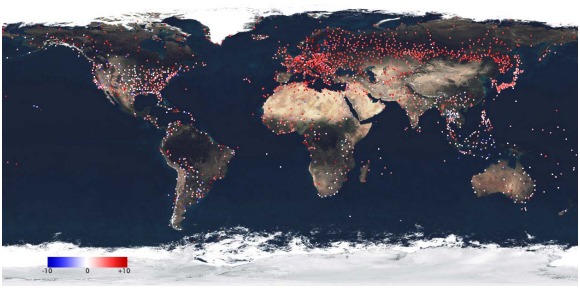Statistical Exploration of Climate Data (Version 1.0)
By Tamra Carpenter, Jon Kettenring, and Robert Vanderbei

Image from R. J. Vanderbei, “Local Warming”, SIAM Review, 54(3), pp. 597-606, 2012. Available on-line,
http://www.princeton.edu/~rvdb/tex/LocalWarming/LocalWarmingSIREVrev.pdf.
Module Description:
In this module, students will learn some basic concepts in statistical thinking about data, with emphasis on exploratory data analysis. The module will analyze daily temperature data collected over 55 years at a single location – McGuire Air Force Base (AFB) in southern New Jersey. The analysis explores the question, “Is there any observable temperature trend over this time period at McGuire AFB?” The challenge is to see a potentially small change within a data set that has both seasonal variability and high daily variability. We will do basic plots to help the students view data in different ways, introduce methods for removing seasonality, and use averaging to reduce day-to-day variability.
This module might be viewed as a “case study” in data analysis. It will give students a taste of what it’s like to do “real world” data analysis. Students will work with a large noisy data set and look at it in different ways to try to answer a specific question. The module does not, however, provide an answer to the question on temperature change that it addresses – it is about the process of data analysis. Each individual analysis (corresponding to a figure in the module) leads us to a new set of questions, which in turn leads to further analyses. This is often the way data analysis proceeds in practice. As the adage goes, “It’s not the destination, it’s the journey.”
For instructors wanting students to interact with data, we provide the MATLAB code to generate each of the individual plots discussed in the text. Thus, the instructor can easily reproduce all studies in the module using MATLAB or reprogram the analyses for some other package. Alternatively, instructors can use this module in the absence of software technology by using the plots generated in the text and discussing their features with the class.
Teaching Setting:
This module was designed for introductory undergraduate statistics students or students in a first course on exploratory data analysis.
QUBES Citation:
Carpenter, T., Kettenring, J., Vanderbei, R. (2018). Statistical Exploration of Climate Data. QUBES Educational Resources. doi:10.25334/Q4GH8W
|